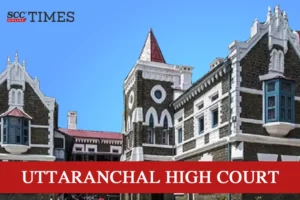Uttaranchal High Court: In the present case, applicant had sought his release on bail as he was in judicial custody for case filed under Sections 1471, 1482, 1493, 3074, 3955, 3236, 3327, 3418, 3429, 35310, 41211, 42712, and 43613 of the Penal Code, 1860; Sections 3 and 4 of Prevention of Damage to Public Property Act, 1984; Section 7 of Criminal Law Amendment Act, 1932; Sections 3/25, 4/25, 7/25 of the Arms Act, 1959; and Section 15/16 of the Unlawful Activities (Prevention) Act, 1976 (‘UAPA’), registered in Police Station Banbhoolpura, District Nainital. A Single Judge Bench of Ravindra Maithani, J., held that the present bail application was not maintainable before this Court, instead an appeal would lie under Section 21 of the NIA Act before the Division Bench of this Court. Thus, the Court dismissed the bail application as being not maintainable.
Counsel for respondent submitted that the bail rejection order was passed by the Additional Sessions Judge, Haldwani and therefore, the bail application was not maintainable, instead applicant ought to have appealed in view of Section 21 of the National Investigating Agency Act, 2008 (‘the NIA Act’).
The Court noted that the word “Special Court” was defined under Section 2(1)(h) of the NIA Act as a Court of Session designated as Special Court under Section 11 or, as the case may be, under Section 22 of the NIA Act. The Court stated that Special Courts were constituted under Section 11 and 22 of the NIA Act and in the State of Uttarakhand, a Special Court was constituted under Section 11 of the NIA Act for the trial of scheduled offences investigated by the National Investigation Agency.
The Court stated that in the present case, the investigation was being done by the State Police, not by the Agency, and cognizance in such cases might be taken by the Sessions Court without the case having been committed to it and Section 16 of the NIA Act makes provisions for this.
The Court referred to Section 22(3) of the NIA Act and stated that the Court of Session of the division shall exercise all the power of Special Court and follow the procedure provided under Chapter IV, which meant that all the powers of Special Court shall be exercised by such Court of Session.
The Court relied on Jaffar Sathiq v. State, 2021 SCC OnLine Mad 2593, wherein the Madras High Court while interpreting Section 22(3) of the NIA Act held that an order passed by a Court of Session dismissing a bail application under Section 22(3) shall be appealable under Section 21 of the NIA Act.
The Court stated that the Court of Session exercising jurisdiction of the Special Court under Section 22(3) of the NIA Act, could exercise all the powers that were conferred on the Special Court under Chapter IV of the NIA Act. The Court further stated that under Section 21 of the NIA Act, appeals were filed against the orders of the Special Court and thus in view of the powers that were conferred on the Court of Session for exercising the jurisdiction of the Special Court, the Court opined that the orders passed by the Court of Session under Section 22(3) shall also be appealable under Section 21 of the NIA Act.
The Court noted that the bail application of applicant was rejected by the Additional Sessions Judge, Haldwani on 10-05-2024 and therefore held that the present bail application was not maintainable before this Court, instead an appeal would lie under Section 21 of the NIA Act before the Division Bench of this Court. Thus, the Court dismissed the bail application as being not maintainable.
[Abdul Malik v. State of Uttarakhand, 2024 SCC OnLine Utt 2628, decided on 02-09-2024]
Advocates who appeared in this case:
For the Applicant: Salman Khurshid, Senior Advocate assisted by Vikas Kumar Guglani, Advocate.
For the Respondent: Manisha Rana Singh, AGA.
1. Corresponding Section 191(2) of the Nyaya Sanhita, 2023 (‘BNS, 2023’)
2. Section 191(3) of BNS, 2023
5. Section 310(2) of BNS, 2023
6. Section 115(2) of BNS, 2023
7. Section 121(1) of BNS, 2023
8. Section 126(2) of BNS, 2023
9. Section 127(2) of BNS, 2023
11. Section 317(3) of BNS, 2023
12. Sections 324(4) and 324(5) of BNS, 2023
13. Section 326(g) of BNS, 2023

